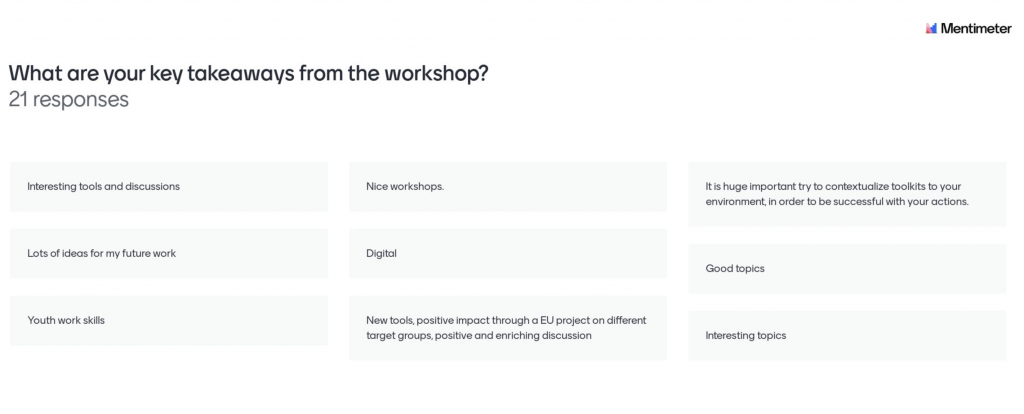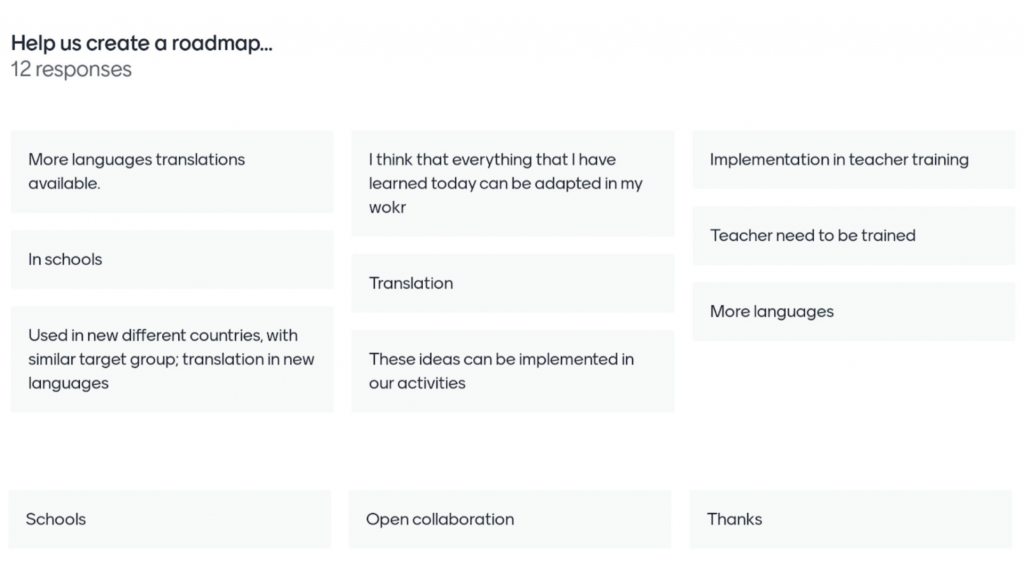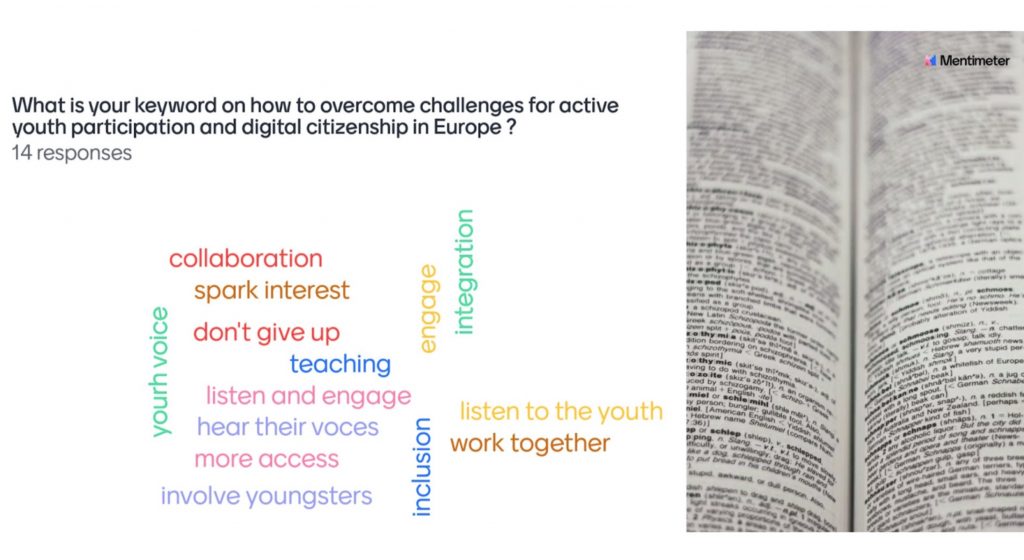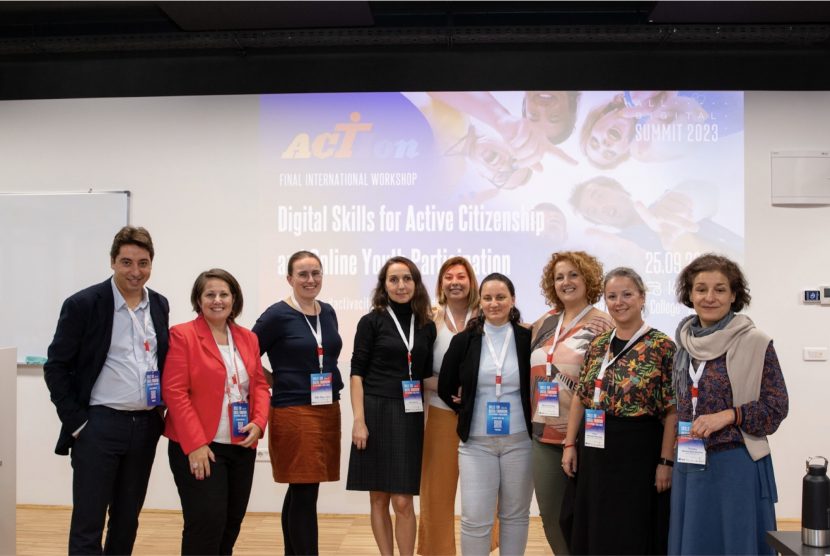ACTIon Final International Workshop: Promoting Digital and Democratic Skills for Active Citizenship and Online Youth Participation
ACTIon Final Workshop was organised with the theme: Digital Skills for Active Citizenship and Online Youth Participation on 25 September during the ALL DIGITAL Summit 2023 in Zagreb-Croatia with the participation of 26 participants – 14 external participants and 12 participants from project partners – from a total of 13 countries – Austria (2), Belgium (2), Bulgaria (3), France (1), Hungary (1), Germany (5), Greece (1), Italy (4), Netherlands (2), North Macedonia (3), Serbia (1) and Spain (1).
Selin Tagmat from ALL DIGITAL opened the workshop with welcoming words for the participants and introduced the agenda of the workshop: The first part of the workshop focused on the presentation of the project and a panel discussion with piloting partners, while the second part, after the coffee break, aimed to provide a hands-on experience to participants about the project’s training programmes in the format of a World Cafe.
Selin invited the participants to watch the ACTIon project video presenting the DigiPAC and MOLA training programmes and sharing testimonials from the young participants.
This was followed by the presentation of the project’s background, methodology and training programmes by Tzvetina Arsova Netzelmann from nexus, ACTIon project’s coordinator. Tzvetina reminded that while a great majority of young people use the internet daily, only a quarter of them use it for civic and political participation, and this gap is even wider for disadvantaged youth. She explained that the ACTIon project aimed to bridge this gap by empowering young people with digital and democratic skills through training, She gave an overview of the methodological framework, concepts and learning objectives of the two training programmes developed by the project:
Digital Participation and Active Citizenship (DigiPAC) is intended for formal education of children and adolescents (14-18 years old) to help them gain following skills and competences:
- How to establish a positive, meaningful and respectful interaction online (netiquette)
- Having a good understanding of inclusion, respect and tolerance
- Learning how to take action against hate speech, discrimination and cyberbullying
- Learning about the ways of self-expression, storytelling, electioneering (defending one’s opinions)
- Using online participation tools
Model for Opinion Leaders Activation (MOLA) for community-based education of young adults (up to 25 years old) to help them gain following skills and competences:
- Safe and efficient browsing on internet
- Searching for health information
- Identifying fake news and disinformation
- Differentiating between fact/opinion
- Understanding how to be a positive opinion leader/online influencer
- Being aware of one’s digital identity: “Think before you post!”
Training materials are available to download here.
Tzvetina also highlighted the achievements of the project’s piloting activities in four of the partner countries, as well as key learnings.
The project presentation was followed by a panel session moderated by Selin Tagmat from ALL DIGITAL where piloting partners from four countries exchanged their insights, good practices and challenges. Selin highlighted that the two main target groups of the training programmes were the young people and educators/trainers and invited panelists to share how these two groups received the training programmes.
The first part of the discussion was dedicated to young people’s perspectives: Savka Savova from HESED talked about her impressions from a youth camp they organised in Samokov, Bulgariа, using the DigiPAC training programme, where young people from diverse backgrounds came together and learned how to live together in harmony, while gaining new digital and democratic skills for active participation.
She explained that the young people might be hesitant at first when they are exposed to the project activities, as they are not used to expressing themselves in public. Especially Roma girls are not encouraged in their communities to be engaged with personal opinion and voice their thoughts on social topics. However, the training programmes showed that when they are offered a safe place and clear framework, they are very happy to get involved with topics like civic education and take an active role in the community providing ideas about improvement of the environment or youth causes and implementing them with the guidance of a mentor.
Savka also presented the potential of Model for Opinion Leaders Activation (MOLA) as a training program for youth activation and the opportunities it reveals for the young people to improve their health and digital literacy, and the perspectives for reaching peers through social media for changing their attitudes and behavior patterns concerning healthy nutrition and positive parenting.
Savka explained that the young mothers from Roma communities are very exposed to disinformation since they are out of all social systems (work and education), but they lack basic skills for critical thinking and tools to resist fake news. The programme is specially designed for the needs of this group of young people providing easy to use algorithms to search, analyze and share information online, but also to encourage them to use their digital skills to create videos with meaningful messages and create socially engaged online content.
The second part of the discussion was on the perspective of educators and trainers who are expected to use the training programmes:
Tzvetina Arsova Netzelmann from nexus shared their learnings when they worked together with teachers in formal learning environments in Germany. The feedback of the involved teachers on the DigiPAC training programme was positive, the topics of civic education and digital competence were perceived as very relevant for the living realities of secondary school students. Trainers appreciated in particular that training activities, such as “My and social media” take the learners right from the beginning with their learning needs and resources up and build bridges between the new knowledge and skills and the everyday life of the young people. The challenge was to adapt the content of some activities to students with special learning needs, an important learning that the training programme should be further tailored to offer an even lower threshold for involvement of disadvantaged young learners.
Mariche Treneska from the Coalition of youth organizations SEGA introduced another dimension to the discussion by sharing insights on the experience of youth workers and youth organizations during their piloting activities in North Macedonia. A series of capacity building activities were carried out for youth organizations and youth workers, as well as for teachers from high schools for digital participation and active citizenship through the introduction of DigiPAC methodology. The most important aspect of SEGA’s intervention was the methodology which offered a variety of non-formal methods to be used or simulated during trainings and follow up activities by youth workers and teachers. All participants involved in the trainings carried out follow up activities and provided positive feedback for further use of DigiPAC.
Regarding the methodology, all three parts from DigiPAC were interesting for youth workers, but the highlight was the youth participation through a special practical session for active using OPIN as this was a practical tool that can be used by youth workers in their daily activities. The youth workers and teachers carried out follow up activities with young people using OPIN as an .innovative online tool for e-participation. OPIN was introduced to all the youth workers, who were then required to create the profiles for the organizations on this platform. This step was important to encourage organizations to create profiles on OPIN, which will motivate them to use this platform in their projects.
On the other hand, Kostas Diamantis Balaskas from Action Synergy provided their experience from the extensive piloting process involving schools from almost all regions in Greece. X He has explained the importance of involving teachers from schools in smaller cities and villages due to the reduced number of training possibilities that address this group and due to the different realities that exist throughout the country. He has mentioned that in Greece the school curriculum does not include courses related with digital media literacy and this is why both teachers and students lack knowledge about key concepts. ACTIon project provided relevant tools for these teachers to explore this issue. The activities that presented a framework of ethics in relation with the use of the internet made the teachers reflect on their own experiences as well as on the experiences of their students. Another aspect that was very important for the Greek teachers participating in the seminar was the issue of democracy and how their students could participate in a digital democracy.
After the panel discussion, Katja Aue from nexus explained the concept of the World Cafe where the participants would be offered hands-on experience on the project’s training programmes on three stations in a rotating format every 20 minutes. Following the coffee break, the participants were divided into three groups for the parallel workshops.
WORKSHOP 1 – MOLA and Youth Community’ Activation Potential: Set Me on F.I.R.E.
Facilitated by ACTIon partners: Savka Savova, Raina Dimitrova and Emilia Mikova – HESED
The aim of this workshop was to help participants discover the F.I.R.E. app – From Idea to Reality & Execution that was developed by the Open Space Foundation from Bulgaria, partner of the ACTIon project. Pepa Peneva Veleva from OSF supported the workshop but unfortunately could not join the meeting due to last minute flight cancellation.
The facilitators presented the features of the app and helped participants to download it to their devices through QR codes. The participants went through the test of the digital literacy modules and evaluated their knowledge in this field based on their final score.
The direct experience with the F.I.R.E app was a prerequisite for a discussion about smart youth work and using digital technologies as a tool for youth training and youth activation. The participants agreed that using the smart technologies in youth work is very useful and presents new opportunities to youth workers and at the same time, it would be more effective when combined with direct work and additional mentoring as traditional approaches in youth activation.
The feedback for the app itself was positive, with some suggestions for improvement of the translation of the test questions and optimisation of the visualization of the content. The participants reflected on what kind of knowledge they can improve in digital literacy and also came up with suggestions for the further improvement of the app.
WORKSHOP 2 – Come and Share Our Netiquette: DigiPAC and Digital Citizenship
Facilitated by ACTIon partners: Tzvetina Arsova Netzelmann, nexus, Katja Aue, nexus
Vesna Konevska Stojanoska, SEGA, and Mariche Treneska, SEGA
The aim of this workshop was to immerse participants into the world of DigiPAC to get familiar with its interactive methods and digital tools. Katja presented briefly Module A and invited participants to join in the activity “Netiquette”, Tzvetina presented Module B and engaged the group during the second round with the activity “Electioneering”, while Marice introduced the OPIN tool, which is used to develop new ideas for local communities, collect and give feedback to ideas, vote them and work together to develop a project. The participants learned how to register to the platform and create their first idea to be shared with others.
WORKSHOP 3 – Bring It to the Next Level: ACTIon Policy Recommendations
Facilitated by ACTIon partners: Kostas Diamantis Balaskas, Action Synergy and Owen Wooden, nexus
The aim of this workshop was to identify the existing challenges and develop proposals for policy makers to improve digital participation and active citizenship for young people at local, national and European level. The participants wrote their ideas on post-its, which were sticked on the flipchart and then was grouped together.
Here is a selection of challenges brought forward by participants:
- For formal education, teachers may not have the authority or the flexibility to include any topic they want in the curriculum
- Youth active citizenship spaces are different from “adult” ones and are underestimated. This means that young people are not represented in the real life
- There is a general disinterest in politics not only among the youth but also among the adults. Many young people live in their own “bubble” and are not interested about the collective but about their personal interests. The importance of active citizenship is low among youth. The use of digital tools is mostly done for communication and entertainment purposes, not for information and participation.
- There is a lack of knowledge/ skills in relation with digital active citizenship from the part of teachers and trainers
- The schools are not ready to support the young people to engage in real digital participation. They may not have the technical capacity and knowledge required for this purpose
- National systems and bureaucratic procedures make hard the introduction of any changes/new ideas/concepts in the national curriculum
- Communit- based trainings need a framework and training material that meets the needs of their local context
- It is very difficult to reach youth who are not in formal education contexts
- Lack of dedicated and coherent curricula in the field of digital participation and active citizenship
- There is a lack of time during the school year and classes
Based on these challenges, following ideas were developed as policy recommendations:
- Increase of the support to organisations who offer teacher training to get acquainted with innovative ways of teaching issues related with active digital citizenship
- Give more importance to Digital Literacy in the framework of Digital Skills Teacher training programs that are offered
- Increase peer learning between teachers through structured activities as a mechanism, of knowledge and experience transfer
- Ensure stability, durability and scalability of digital citizenship projects with or without funding
- Facilitate the opening of the schools to the community and the cooperation of the school with external actors in order to incorporate in the teaching current topics
- Provide funding at local level to facilitate the realization of projects from young people interested to be active
- Provide opportunities for youth to directly apply for funding for projects in relation with their topics of interest
- Increase funding for teacher training programs in the field of digital citizenship. Make clear the distinction between digital skills and digital citizenship.
- Raise awareness on the different forms of active citizenship and organize campaigns to activate youth and to specify that politics is not only something for politicians
- Include digital citizenship as part of the curriculum at the national level
- Promote the cooperation between different schools (at local and regional level) for the sharing of expertise and experience
- Build curricula that can be implemented across EU for all countries
After the conclusion of the parallel workshops, Selin Tagmat from ALL DIGITAL invited the participants for a final reflection with some key questions by using Mentimeter.
She started by asking participants about their key takeaways from the ACTIon workshop and the main highlight of answers was about gaining insight into new tools and topics. The World Cafe format with rotating groups was also well appreciated.



The second question was about suggestions on how the training programmes can be adapted and used in the future and the answers focused on the translation in different languages.

And finally, the workshop ended with a compilation of keywords on how to overcome challenges for active youth participation and digital citizenship in Europe, which especially highlighted listening to the voice of young people!


No Comments